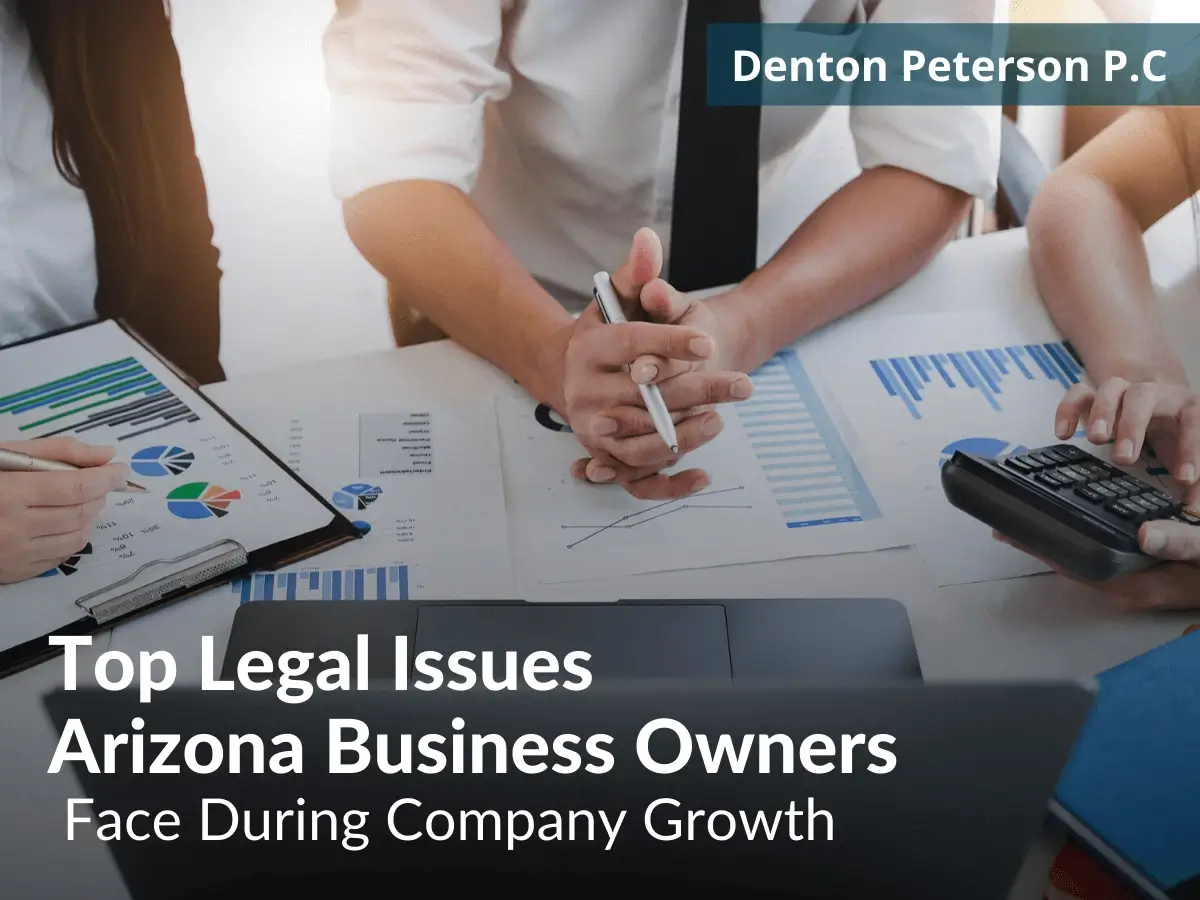Top Legal Issues Arizona Business Owners Face During Company Growth
There’s no question that getting a business up and running is no easy task, and business owners who have successfully started a business can rightly feel proud of their accomplishments. But businesses experience growing pains, and company growth can lead to a whole new set of legal problems for business owners. Here are the top legal issues facing Arizona business owners during company growth.

Partners or Shareholders (dis)Agreements
As businesses grow, what it means to be a partner can change. What might originally begin as a project among friends or a solo venture can soon become a serious financial endeavor. The money or investment at stake grows along with the business and can cause disputes among partners. These partners might soon discover that their ideas regarding the operation of the business and how profits and revenue are to be used and distributed don’t quite mesh as well as they first thought.
As one can imagine, this may often lead to serious disputes involving the growing business. Partners or shareholders who feel they aren’t receiving what they’re due, or who think the business is not being run correctly, might feel that only a case in court can solve the issue. Litigation, even if it doesn’t go all the way to trial, is expensive; and resolving partner issues this way is not ideal, even if it is sometimes necessary.
The best way to avoid costly partner disagreements is to plan ahead and make sure your business’s controlling documents (operating agreements, bylaws or partnership agreements) are well-drafted and clear. When partners disagree on certain points regarding the business, the controlling document is going to be the final authority. If the matter goes to court, a lot will hinge on what that document says. Many disagreements arise in the first place because the controlling document does not exist or is either unclear or poorly drafted.
By the time trouble comes up, if good controlling documents aren’t already in place, it’s too late. However, you can still mitigate the damage of a legal fight by consulting a Gilbert business attorney experienced in both business and contract law. The company’s controlling document will govern any dispute you’re involved in. If the document doesn’t address certain issues, those may be covered by Arizona statutes or common law. A Gilbert business attorney familiar with both Arizona’s business laws, including Arizona’s most recent amendments to its LLC Act, as well as contract law, will be a huge asset in making sure your company comes out of a partner dispute with the least damage possible.
Employment Disputes
With a growing business come more employees, and a larger workforce naturally increases the risk of employment disputes. The variety of employment disputes is too great to cover in detail in this article, but as a growing business potential issues include claims for discrimination, unpaid or underpaid overtime or other wages, disputes surrounding medical or other leave, paid or unpaid, and much more. As the owner of a growing business, there are a few things you can do to mitigate the risk of employment disputes within your company.
First, and most importantly, follow the law. Federal and state laws govern a wide variety of employment matters, from hours and wages to leave time, discrimination and more. Many of these laws have notice requirements, meaning that employers are required to notify their employees of their rights under certain federal and state laws. Employment law is a broad and complex field, and violations can result in serious penalties. It’s a good idea to have a Scottsdale employment attorney on retainer you can consult with to make sure you’re complying with all relevant employment laws. Working with an employment attorney serving Scottsdale before employment disputes actually arise will be a huge benefit because your attorney will already be familiar with your business and employment situation.
Related to the first point, keep tabs on your employees and make sure things are running smoothly. Businesses can run into problems when their employees break the law or otherwise incur liabilities that can then be attributed to the company. Discrimination by a rogue employee or poor mid-level management leading to wage issues are just a couple of examples of situations that can lead to legal problems for your business.
Finally, be selective in your hiring. This doesn’t mean you have to set an impossible barrier to entry at your company. What this means is simply taking the time to carefully consider candidates before hiring. Make sure the people you hire are a good fit for your business and are aware of what you will be expecting from them and what they can expect from you. Being up-front about what you’re requiring, and offering, will help prevent any disillusionment on the part of your employees.
Trademarks and Intellectual Property Disputes
You don’t have to be a cutting-edge software company to have confidential business information that is worth protecting. Any information that gives you a competitive advantage in your market is worth protecting, and businesses often find themselves in disputes over this kind of proprietary information.
Confidential information is provided certain protections under the law (for more information on confidentiality or non-disclosure agreements, click here. For more information on trade secret law in Arizona, check out this article). To help you stay compliant with trade secret laws as well as keep your own confidential information safe, here are a few tips.
For starters, have your employees sign a good confidentiality or non-disclosure agreement. The details of confidentiality agreements are covered in another article (referenced above) but having a well-drafted confidentiality agreement in place with your employees, vendors, etc., will be a huge help in the long run when it comes to protecting your proprietary information.
Second, be careful who you hire for certain tasks. Hiring a competitor’s star employee might seem like a dream come true but can land you a heap of legal trouble if you’re not careful. Employers can get in trouble if they hire someone who uses confidential information from their previous job in violation of a confidentiality agreement or trade secret law, if the new employer knows or should have known that the confidential information was improperly acquired or used. So, if your competitor’s star employee comes over to your business and starts working wonders and you even suspect he might be using information he improperly brought over from his previous job, look into the situation. Your business could face serious liability if you don’t.
Entity-related Issues
Finally, as businesses grow, issues relating to the entity you’ve chosen to do business through can arise. These issues can take on many different forms, but this article will focus on two: using the wrong entity type or outgrowing your current entity type, and failing to follow the legal formalities for your chosen entity.
First, having the wrong entity for your business’s needs can be a problem. The type of entity through which you choose to operate your business will determine important factors such as liability and taxation of your business and you personally along with any other partner in the business. Furthermore, certain businesses are required by law to operate through specific types of entities. You may find that the entity you chose to start up your business is no longer the appropriate one for your growing business. Changing entity types may be desirable but can be confusing. When it comes to settling on an entity through which to do business, or to changing entity types, it’s best to work with an experienced business attorney serving Gilbert. They will be able to help you choose the best type of entity for your business and navigate the ins and outs of switching entity types for your business if necessary.
Second, failing to comply with the legal formalities required for the operation of your business can lead to problems, especially as your business grows. In the beginning, your business may be so small that it’s little more than an extension of yourself. You might mingle funds, cover business expenses out of your own pockets, and take other actions which don’t strictly follow the formalities of owning a business through an entity. This might seem harmless but can lead to problems in the long run. It’s always best to strictly observe the distinction between the business and its shareholders or members. Don’t mingle funds. Make sure business expenses are coming out of the business account. If the business needs extra cash, make sure any injection of funds by the partners or shareholders is done in the appropriate way, keeping track of where the money came from and where it’s going. Keep the business as an entity distinct from its partners, shareholders or members. These technical and procedural steps can help partners avoid liability and can keep your personal funds out of reach if your business’s creditors come calling. A little attention to detail can go a long way.
Starting a business is hard work; keeping one running successfully as it grows can be even harder. The last thing you need is to be facing legal problems on top of the day to day issues that your business faces. The team at Denton Peterson has decades of experience assisting businesses with all their legal needs. Our Arizona business attorneys have been handling employment, contract, intellectual property, and other business-related matters for year, and are eager to help your business get the legal counsel it needs.

Brad Denton – Denton Peterson, PC
1930 N Arboleda #200
Mesa, AZ 85213
Office: 480-325-9900
Email: [email protected]
Website: https://arizonabusinesslawyeraz.com
